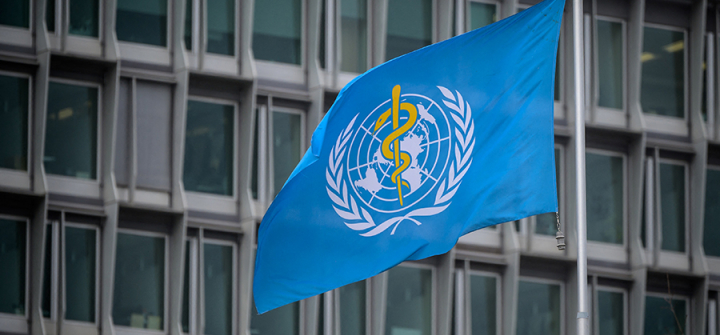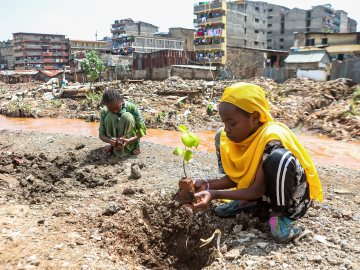A High-Stakes World Health Assembly, Previewed
Shattered by a pandemic that exposed a flawed and failing global health system, the world has a rare chance to remake both WHO and core global infrastructure for pandemic preparedness and response.
Will it?
In a virtual preview on Thursday of next week’s World Health Assembly, a passel of global leaders and health experts mulled the expectations and possibilities with stirring rhetoric, clear-eyed vision, and palpable dread that national leaders will once again snatch timid defeat from the cusp of common victory.
“Clearly there’s no shortage of challenges, nor potential solutions to address some of these weaknesses, but there's also no guarantee that we will seize this moment,” said Suerie Moon, co-director of the Global Health Centre at The Graduate Institute, Geneva.
The WHO’s supreme decision-making body will consider weighty recommendations from 3 recent key reports that “will have far-reaching ramifications for the global health architecture of the future,” said WHO Director-General Tedros Adhanom Ghebreyesus in a recorded statement for the Graduate Institute’s virtual event.
Recommendations include the invocation of a rarely used international convention to establish a pandemic treaty and radically reform member states’ contributions to the WHO budget, and other major changes for WHO.
The 74th World Health Assembly—“arguably one of the most important in the history of WHO,” according to Tedros—will be exceptional not just because of COVID-19, the related weighty topics, and virtual format, but because of its packed schedule of 60-70 items. Highlights:
Pandemic Treaty
One of the most critical considerations before WHA74: whether to launch negotiations on a pandemic treaty.
“While we have systems at least to try to deal with a crisis like climate—and when you have a financial crisis, we have institutions that have to step up to try to avoid economic disaster—in the case of a pandemic, we don’t,” said Gro Harlem Brundtland, former WHO director-general and co-chair, Global Pandemic Preparedness Monitoring Board. “The vaccine situation is an illustration that [the] whole of government approach, whole of world approach at the highest level is not there.”
Added Ellen Johnson Sirleaf, former president of Liberia and co-chair of the Independent Panel for Pandemic Preparedness & Response: “We need to take pandemic containment as seriously, we believe, as we take other dangers of mass destruction, such as nuclear proliferation, chemical weapons, or destructive forces of humanity.”
While the treaty is considered long overdue by many, it’s too early for details of how it would work, though a “complete system for preparedness and response” is needed, said Julio Frenk, president of the University of Miami and a former health minister of Mexico.
“We need to create a collective mechanism so that countries who are honest with the rest of the global community, and report outbreaks, will not be penalized by that,” Frenk said. “And contrary-wise, when we have those mechanisms, countries that hide information or delay reporting should face sanctions because they’re putting everyone at risk.”
Calling the pandemic a “once in a century health event,” he added: “If we don't take this opportunity to really introduce the reforms, and we go to what's happened with previous pandemics that we just simply after the acute emergency, go back, I think we will have failed in a major way. We will have failed, and millions of people who have lost their lives and their jobs and their livelihoods and their health.”
The treaty approach has been pulled from the WHO constitutional toolkit only once before: the 2005 Framework Convention on Tobacco Control. It would be a major step toward rectifying the world’s ineffective response to COVID-19, but it will not come quickly. While advocates are pushing for the treaty to be adopted within a year, that’s “very optimistic,” said international law expert Gian Luca Burci, who noted that the FCTC took 4 years to negotiate.
If momentum builds for the treaty, the WHA would establish a negotiating body that would produce a “zero draft” of basic tenets—the zero draft is a critical step because member states would be obligated to follow the treaty, Burci said. The treaty would later be brought to the assembly for approval.
Frenk noted that a political statement about the pandemic treaty from the UN General Assembly this fall would be important to a successful launch.
WHO Reform
Revitalizing WHO and its budget will be another key topic for WHA 74:
- The fact that 80% of the WHO budget is funded by voluntary contributions and 20% by assessed contributions from member states has weakened the organization and blunted its effectiveness. Frenk called for increasing the assessed contributions from member states to fund two-thirds of the WHO budget. “We have a weak international or global health system, by design. We need to redesign it to be independent, to be fully funded, so that it can protect our own citizens in our own countries,” Frenk said.
- The election process of the director-general has already begun with a call for candidates, and the election itself will take place at next year’s WHA. Tedros, who was elected to a 5-year term in 2017, is seeking reelection. WHO watchers consider him a safe bet to remain in office. Discussion of changing the tenure of the director-general to a single 7-year term drew strong support from Brundtland and Frenk; this would prevent WHO chiefs from having to campaign for reelection—making them more independent.
Vaccine Equity
Former political leaders and current global health experts pressed the case for urgent steps to address vaccine inequities that have left many developing countries with small fractions of their populations covered as wealthy countries bask in the hope afforded by plentiful supplies.
“The world is in this together. And we must come out of this pandemic together. As has been said before, no one is safe until all of us are safe,” said Sirleaf. “This has everything to do with vaccine equity.”
Reiterating the panel’s recommendations on vaccines, Sirleaf called on wealthy countries to deliver 1 billion vaccine doses to low- and middle-income countries via the COVAX Facility by September 1 and another billion by mid-2022.
Sirleaf also called for the expansion of vaccine manufacturing to countries in the global South, adding that if agreements for voluntary licensing and technology transfer aren’t in place by September, then intellectual property protections should be suspended—the “TRIPS waiver.”
More WHA74 Issues to Watch
2 Governments, 1 Country: What to do with Myanmar (Burma)? 2 governments have presented credentials to be part of the assembly. One is the military government that seized power in February. The other is the deposed civilian government. A credentials committee will review the situation and make a recommendation to the plenary, according to Burci.
Controversies: A draft resolution on assisting the Palestinians caught in conflict with Israel in recent weeks will likely draw a heated debate. Blocked repeatedly by China in recent years, Taiwan is again seeking to participate in the assembly as an observer.
Virtual challenge: Given the online nature of WHA74, the drama of informal drafting groups working on resolutions and issues through the night has been nixed. Most of the drafts have been debated already by permanent missions in Geneva and will be finalized by Sunday, before the assembly begins.
Hello, Faroe Islands: Denmark is seeking associate member status for the Faroe Islands at the assembly. “That's an interesting revitalization to something that really seemed like an historical curiosity,” Burci said.
Join the 50,000+ subscribers in 170+ countries who rely on Global Health NOW for the latest public health news. Sign up for our free weekday newsletter, and please share the link with friends and colleagues.
The World Health Assembly, which sets WHO priorities, convenes virtually May 24 – June 1. Image: Fabrice Coffrini/AFP via Getty Images





